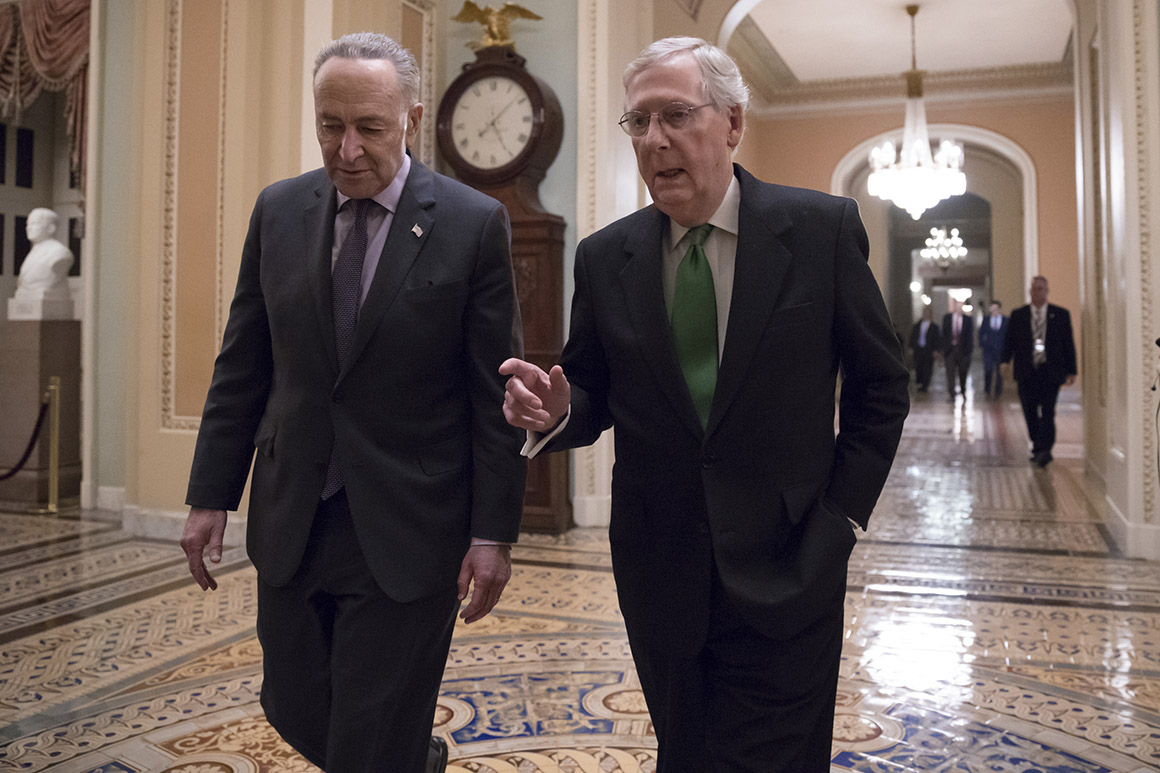
“I’m about as conservative fiscally as you can find on Capitol Hill. But my approach to this is: I’m pretty much Mr. Senator whatever it takes, we’ve got to get the economy back standing so when the virus is contained and it will be contained we can have an economy to come back to,” Sen. John Kennedy (R-La.) said.
McConnell and Schumer have seen some ups and downs in their own relationship. In 2018, the pair made a rare joint appearance at the University of Louisville’s McConnell Center, where the two men were jovial and exchanged bottles of bourbon. They also clinched a two-year budget caps agreement last year.
But relations soured during Trump’s impeachment. There’s also residual bitterness at McConnell from Democrats over his decision to block Supreme Court nominee Merrick Garland, and then use partisan muscle to push Trump picks Neil Gorscuh and Brett Kavanaugh onto the high court.
Yet the McConnell-Schumer dynamic is nowhere near as toxic as relations got between McConnell and former Senate Majority Leader Harry Reid (D-Nev.). While Reid and McConnell both served on the Appropriations Committee and prided themselves on their legislative flexibility, their relationship completely fell apart by the time Reid retired in 2016. The bitterness between the two men carried over onto the Senate floor, paralyzing the chamber’s work.
So far, McConnell and Schumer are projecting confidence about their ability to work together again to stave off the unprecedented coronavirus crisis.
“Both sides are going to be sufficiently motivated and we need to be bipartisan on this and I’m hoping that spirit of cooperation will really kick in,” said Senate Majority Whip John Thune (R-S.D.).
“I think we always have — after 9/11, after 2008. We’ll do it again,” added Sen. John Cornyn (R-Texas), a top adviser to McConnell.
But the 2008 bailout of the U.S. financial services industry was a searing experience for both men. Schumer had ridden into the Senate Democratic leadership on his ability to raise money, especially from Wall Street. Schumer later received criticism from progressives over those corporate relationships.
McConnell voted for the Troubled Asset Relief Program (TARP), as the 2008 Wall Street rescue bill was called, only to see the Democratic Senatorial Campaign Committee — then run by Schumer — attack him over the issue during his reelection campaign that year. And McConnell — who is known for never forgetting anything — is running for reelection again this year.
Even before confronting each other over the next emergency package, the two Senate leaders will have to get their own members in line. McConnell convinced his caucus this week to vote for the House-passed coronavirus “Phase 2” stimulus package, despite GOP objections over the paid sick leave provisions. In the end, the package passed on Wednesday 90-8. All the ‘no’ votes were Republicans.
Republicans are expected to unveil their “Phase 3” proposal Thursday. Among the ideas that were under discussion at a GOP lunch Wednesday were direct payments to individual Americans who make less than a certain amount; the deferment of student loans for potentially three months; and provisions for small businesses.
Sens. Marco Rubio (R-Fla.) and Susan Collins (R-Maine) are discussing giving small businesses forgivable loans, which would be administered by a bank, credit union or some other type of lender.
Meanwhile, Schumer has been speaking directly with Mnuchin, including twice on Wednesday. Schumer and Senate Democrats are proposing at least a $750 billion package to expand paid family leave, paid sick leave and unemployment insurance. The proposal allocates $400 billion in emergency appropriations to support the health care system, child care and small businesses and $350 billion to social safety net programs.
Sens. Patty Murray (D-Wash.) and Kirsten Gillibrand (D-N.Y.) said Wednesday the third stimulus package the Senate will consider must include a much broader paid sick leave policy in order for it to pass.
“We can’t just do any type of response that only protects large corporations and businesses and not strengthen the social safety net which is where people are going to be needing the most help,” said Sen. Tammy Duckworth (D-Ill.) in an interview.
Schumer has joined Pelosi in calling for “four corner” negotiations between the party leaders in both the House and Senate, but McConnell has expressed no desire so far to sit down with Pelosi.
Yet some House Democrats fear that McConnell will try to pick off enough Senate Democrats to reach the critical 60-vote threshold in that chamber, pass a bill, and then try to “jam” the House politically. Pelosi has announced that Democrats will draft their own “Phase 3” proposal to give them bargaining power in the Senate’s talks.
The discussions come as coronavirus is finally hitting Congress. Two House lawmakers have contracted the virus and more than a dozen are in self-quarantine after having been exposed to colleagues or other individuals who tested positive.
McConnell has vowed to keep the Senate in session until he and Schumer can pass a bill. Some senators have called for remote voting, but so far, appear to be staying put. The two leaders hope to have a deal in place by as early as this weekend, if they can reach one.
Source: politico.com
See more here: news365.stream






